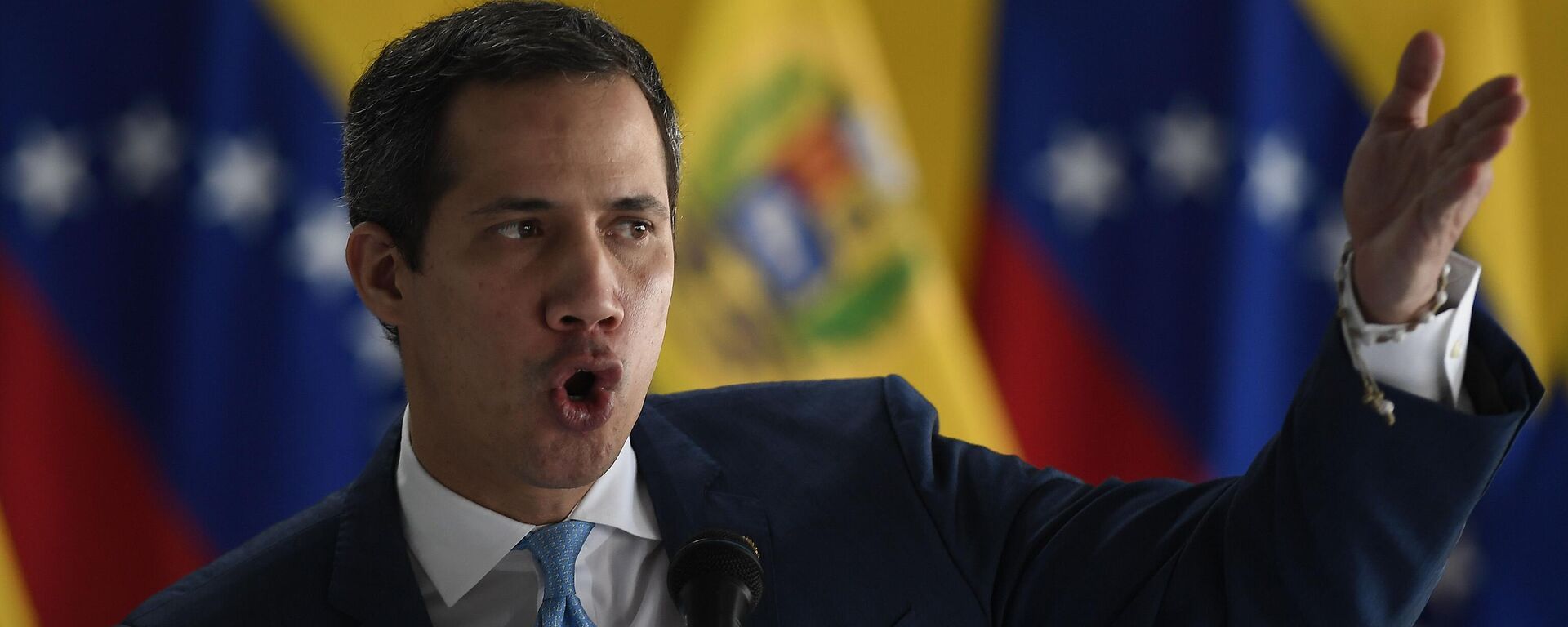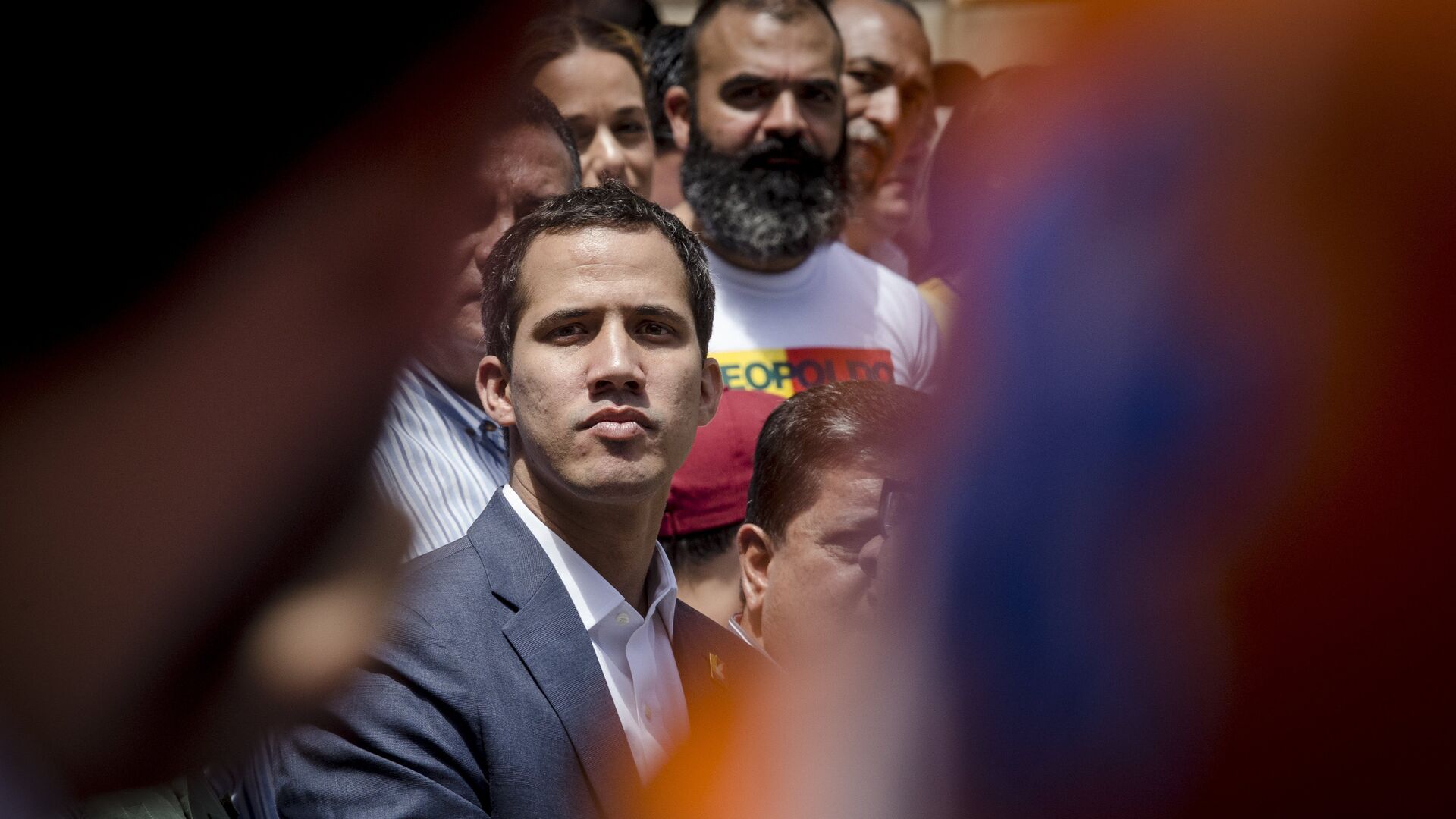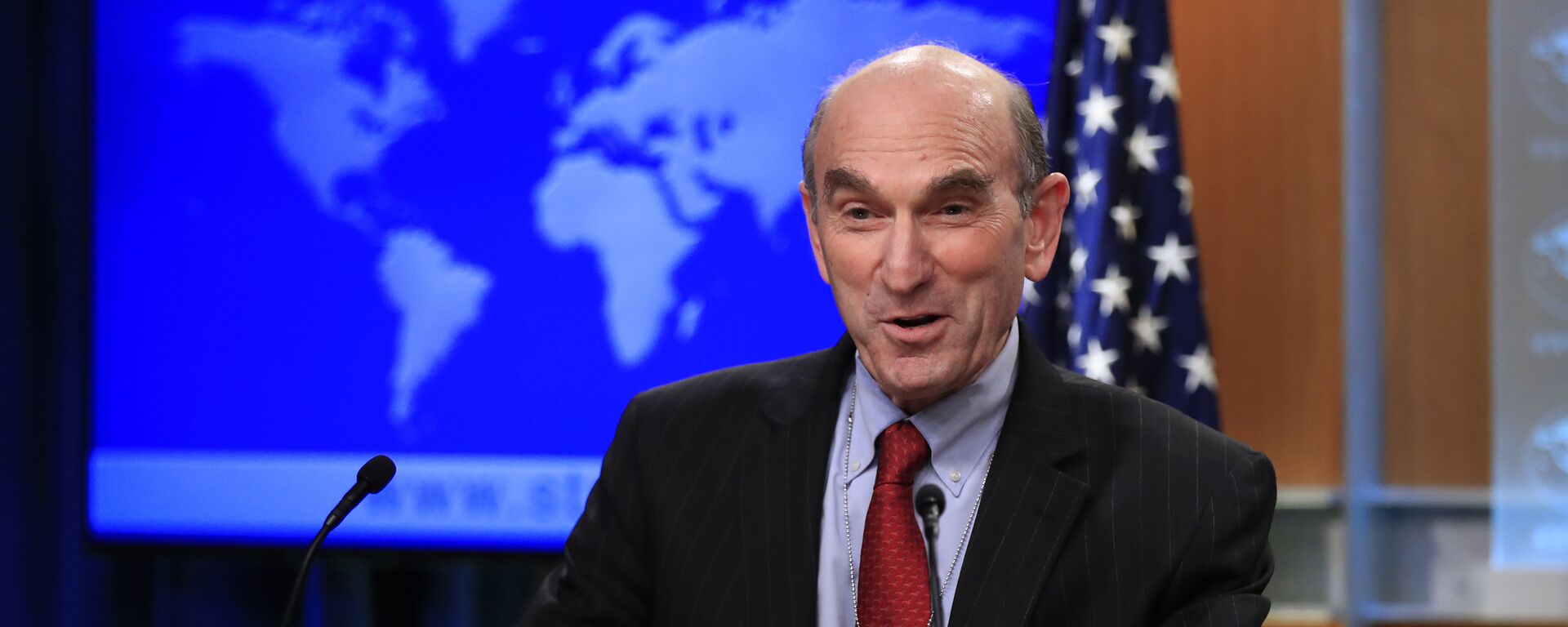https://sputnikglobe.com/20230104/never-gonna-give-you-up-us-to-continue-backing-venezuelas-guaido-after-opposition-abandons-him-1106046187.html
Never Gonna Give You Up: US to Continue Backing Venezuela’s Guaido After Opposition Abandons Him
Never Gonna Give You Up: US to Continue Backing Venezuela’s Guaido After Opposition Abandons Him
Sputnik International
Even as the opposition throws in the towel and Venezuelan oil flows back into American pumps, the US continues to insist the elected government in Caracas is... 04.01.2023, Sputnik International
2023-01-04T23:57+0000
2023-01-04T23:57+0000
2023-01-04T23:52+0000
americas
venezuela
juan guaido
opposition party
nicolas maduro
us interventions
https://cdn1.img.sputnikglobe.com/img/107274/15/1072741536_0:0:3073:1728_1920x0_80_0_0_aad411c9f0b692bdf6e563105caf6c12.jpg
The US will continue to recognize the so-called ‘interim presidency’ of Juan Guaido even after Venezuelan opposition parties recently voted to abandon their claim to the office, the White House said Wednesday."Our approach to [Venezuelan President] Nicolas Maduro is not changing,” State Department spokesperson Ned Price stated in comments to reporters. The head of state recognized by the country’s military and civic institutions, Price insisted, “is not the legitimate leader of Venezuela.”Instead, the US will “continue to recognise” what Price called “the only remaining democratically elected institution in Venezuela today… the 2015 National Assembly.”But it appears the US is refusing to recognize the decision of that body, which voted to dissolve their simulated government last week.On Friday, Guaido’s claim to the presidency was terminated by the 2015 National Assembly – which continues to proclaim itself the country’s legitimate legislature even though its mandate expired in 2020 following the conclusion of its members’ 5-year terms.But the sincerity of the US government’s public refusal to recognize Maduro as president is not entirely clear. Just a week after Russia launched its special military operation in Ukraine in late February, senior US officials traveled to Caracas in a bid to convince their longtime target to provide them with access to Venezuelan oil supplies.In November, the Treasury Department granted Chevron a six-month license to restore its operations in the Caribbean country in a move the US presented as a way to pressure the Venezuelan government to return to negotiations with the country’s notoriously obstinate political opposition.Discussions between the Maduro administration and the US-backed opposition groups were suspended in 2020 after the US successfully pressured authorities in Cape Verde to extradite Alex Saab, a Venezuelan diplomat who was arrested on dubious charges while en route to Iran on a diplomatic mission.A massive oil tanker arrived in Caracas on Tuesday to make its first collection as part of a 500,000-barrel quota of heavy crude expected to be shipped to Chevron’s refinery in Pascagoula, Mississippi, this month.The US abandoned diplomatic relations with Venezuela in 2019 after the Trump administration claimed without evidence that the country’s presidential elections were fraudulent, with a number of European nations immediately following Washington’s lead. Western states rallied around Guaido – a largely-unknown disciple of disgraced opposition figure Leopoldo Lopez – who they insisted was Venezuela’s legitimate president despite him never having run for the office.The US government was also directly implicated in the attempted 2002 coup d’etat which nearly overthrew revolutionary firebrand Hugo Chavez, Maduro’s direct predecessor.The top Reagan administration official was heavily implicated in the Iran-Contra affair and closely linked to some of the US government’s most violent and scandalous regime change operations in Latin America in living memory.Abrams was appointed the US special envoy to Venezuela in 2019. In that capacity, Abrams helped impose a deadly sanctions regime on Caracas which former UN Special Rapporteur on Human Rights Alfred de Zayas estimated had killed over a hundred thousand Venezuelans by 2020.
https://sputnikglobe.com/20221230/so-long-farewell-venezuelan-opposition-puts-end-to-interim-government-led-by-juan-guaido-1105936413.html
https://sputnikglobe.com/20190427/maduro-us-envoy-chavist-1074508994.html
americas
venezuela
Sputnik International
feedback@sputniknews.com
+74956456601
MIA „Rossiya Segodnya“
2023
News
en_EN
Sputnik International
feedback@sputniknews.com
+74956456601
MIA „Rossiya Segodnya“
Sputnik International
feedback@sputniknews.com
+74956456601
MIA „Rossiya Segodnya“
venezuela, juan guaido, opposition party, nicolas maduro, us interventions
venezuela, juan guaido, opposition party, nicolas maduro, us interventions
Never Gonna Give You Up: US to Continue Backing Venezuela’s Guaido After Opposition Abandons Him
Even as the opposition throws in the towel and Venezuelan oil flows back into American pumps, the US continues to insist the elected government in Caracas is illegitimate and the unelected Juan Guaido is the real president of Venezuela.
The US will continue to recognize the so-called ‘interim presidency’ of Juan Guaido even after Venezuelan opposition parties recently voted to abandon their claim to the office, the White House said Wednesday.
"Our approach to [Venezuelan President] Nicolas Maduro is not changing,” State Department spokesperson Ned Price stated in comments to reporters. The head of state recognized by the country’s military and civic institutions, Price
insisted, “is not the legitimate leader of Venezuela.”
Instead, the US will “continue to recognise” what Price called “the only remaining democratically elected institution in Venezuela today… the 2015 National Assembly.”
But it appears the US is refusing to recognize the decision of that body, which voted to dissolve their simulated government last week.
On Friday, Guaido’s claim to the presidency was terminated by the 2015 National Assembly – which continues to proclaim itself the country’s legitimate legislature even though its mandate expired in 2020 following the conclusion of its members’ 5-year terms.

30 December 2022, 22:33 GMT
But the sincerity of the US government’s public refusal to recognize Maduro as president is not entirely clear. Just a week after Russia launched its special military operation in Ukraine in late February, senior US officials traveled to Caracas in a bid to convince their longtime target to provide them with access to Venezuelan oil supplies.
In November, the Treasury Department granted Chevron a six-month license to restore its operations in the Caribbean country in a move the US presented as a way to pressure the Venezuelan government to return to negotiations with the country’s notoriously obstinate political opposition.
Discussions between the Maduro administration and the US-backed opposition groups were suspended in 2020 after the US successfully pressured authorities in Cape Verde to extradite Alex Saab, a Venezuelan diplomat who was arrested on dubious charges while en route to Iran on a diplomatic mission.
A massive oil tanker
arrived in Caracas on Tuesday to make its first collection as part of a 500,000-barrel quota of heavy crude expected to be shipped to Chevron’s refinery in Pascagoula, Mississippi, this month.
The US abandoned diplomatic relations with Venezuela in 2019 after the Trump administration claimed without evidence that the country’s presidential elections were fraudulent, with a number of European nations immediately following Washington’s lead. Western states rallied around Guaido – a largely-unknown disciple of disgraced opposition figure Leopoldo Lopez – who they insisted was Venezuela’s legitimate president despite him never having run for the office.
The US government was also directly implicated in the attempted 2002 coup d’etat which nearly overthrew revolutionary firebrand Hugo Chavez, Maduro’s direct predecessor.
“The failed coup in Venezuela was closely tied to senior officials in the US government,” the Observer
noted in 2002. “The crucial figure,” they wrote, was Elliott Abrams – “who gave a nod to the attempted Venezuelan coup.”
The top Reagan administration official was heavily implicated in the Iran-Contra affair and closely linked to some of the US government’s most violent and scandalous regime change operations in Latin America in living memory.
Abrams was appointed the US special envoy to Venezuela in 2019. In that capacity, Abrams helped impose a deadly sanctions regime on Caracas which former UN Special Rapporteur on Human Rights Alfred de Zayas
estimated had killed over a hundred thousand Venezuelans by 2020.




